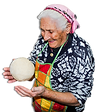NADA SABER
Captured by The Recipe Hunters in Lebanon

Meet Nada!
Nada Saber is originally from the quaint hillside village of Kherbet Kanafar in Bekaa Valley, a hollow basin of land nestled between Mount Lebanon and the Eastern Lebanese mountains. Bekaa Valley is known throughout Lebanon for it's fertile soils and lush prairie land. Nada grew up around delicious homemade food made by her mother, grandmother and aunts. She is very proud to be able to share her culinary traditions and recipes working as a chef at Tawlet.

What are your favorite family recipes?
My mom would make the best stuffed intestines and stuffed grape leaves and my grandma would make incredible stuffed cabbage leaves that I loved. When I married, my mother-in-law was even better at cooking than my family (don’t tell anyone I said that) and she would cook everything for us. After 12 years of marriage, I knew it was time to pick up some of her tricks. I began to ask her, my friends and family for recipes and advice. I learned how to make the mouneh from the ladies of the village, my family’s cook books and my mother-in-law. Once I found a recipe that I liked, I would work on it until perfection."

How did you start your mouneh business?
"When my children went off to university, they would go to fairs and festivals throughout the country. They needed some extra cash so they asked me if I could prepare extra mouneh for them to sell at these fairs and markets (mouneh is the word for the Lebanese pantry which is stocked full after the autmun harvest of jams, preserves, dried grains, dried herbs, and pickles). My children sold the mouneh at these festivals during their free time, but when they graduated university and began their formal careers, they no longer had they time to sell my products at the festivals. This did not stop the calls coming from, eager customers. That's when my husband and I decided to take over the entire business. My husband, Nabil, used to work in construction, but now he is helping me more and more. We are a great team and it’s a lot of fun to work together. I hope that one day in the future we can expand and hire people to help."
Nada's Fried Eggplant With Yogurt Recipe
nada's Fatteh al-betenjane
Do you have any funny cooking memories?
"When I was newly married I wanted to make a grand gesture for my husband so I tried to make one of his mother’s dishes, potato soufflé with meat inside. I asked my mother-in-law how to make it but she forgot to mention to add salt. I followed the directions exactly but once the potatoes and meat were in the oven, I realized with horror, that there was absolutely no salt in the dish. I tried to save the dish by adding it at the end, but it was too late. During the meal, my husband told me it was great because he knew how much effort I put into it. However, a few days later he told me that he never really loved soufflé and that he hoped he wouldn't have to eat it again."

Tell us about the Souk el Tayeb?
"I was the first to come to the Souk el Tayeb. My husband and I are the head of the Souk community. We have a lot of regular customers, it's like a family and if we don't show up we get a lot of concerned calls. The first time I went to the Souk el Tayeb I was talking to someone from Zgharta and he was speaking a little differently. He greeted us by saying, “marhabo” while we say “marhaba” and it was the first time I realized different dialects exist in Lebanon. The souk attracts a mix of people from various backgrounds, speaking various dialects and from different parts of Lebanon. I remember being so intrigued and interested in the people since the beginning. Every week since then has been a new and enjoyable experience."
What is your history with Tawlet?
"One month after Tawlet opened Kamal asked me, “so, why aren’t you cooking here?” I told him I had no experience cooking at a restaurant but he encouraged me by saying, “cook like you are cooking for your family” so I decided to give it a try. I was very nervous the night before my first day at Tawlet. I did not sleep because I was so stressed and because I knew it was a big responsibility. I came here with raccoon eyes and I felt like I was back at school pulling an all-nighter before a test. I was anxious until the moment I served the food. When the customers tasted the food, enjoyed it, and told me it reminded them of their mother’s and grandmother’s cooking, all my stress was relieved and I slept like a baby that night. Now when I prepare food for Tawlet I think about cooking for my children and how much the customers at Tawlet would enjoy my cooking just like my children do."

How has Souk el Tayeb and Tawlet affected your life?
"My children grew up and are now independently employed. Tawlet and the Souk el Tayeb reinvigorated my life. They gave me a new purpose and a way to spend my time in a positive way. I am now able to generate an income and do what I love to do!"
If you were living on a deserted island and could only bring one kitchen appliance, one meal, and one spice what would they be?
“That is a very hard question. I can't decide what food because I love all food but if you force me I’d say a knife, tabbouleh, and salt.
Written by The Recipe Hunters: Anthony Morano and Leila Elamine
PEOPLE BEHIND SOUK EL TAYEB








